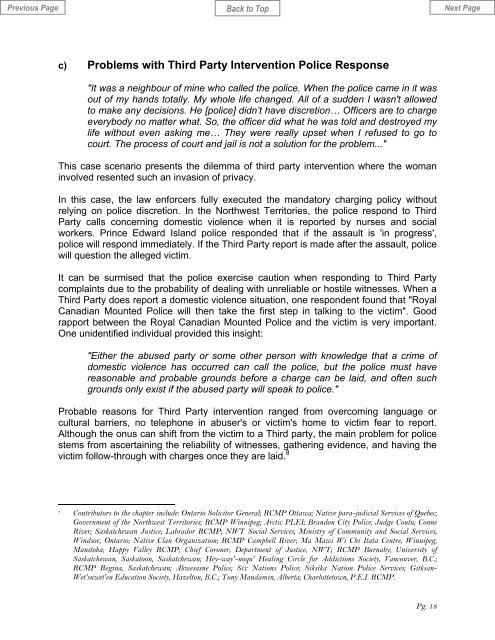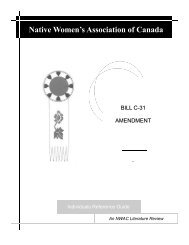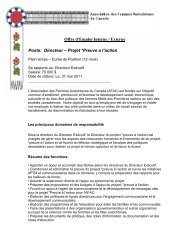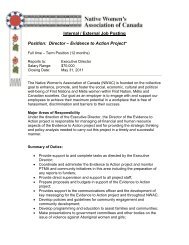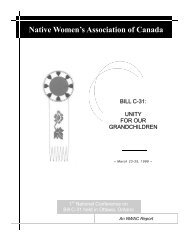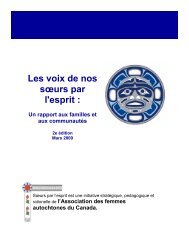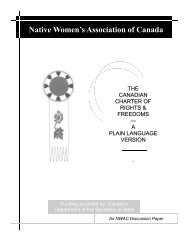POLICE CHARGING POLICIES & DOMESTIC VIOLENCE - Native ...
POLICE CHARGING POLICIES & DOMESTIC VIOLENCE - Native ...
POLICE CHARGING POLICIES & DOMESTIC VIOLENCE - Native ...
- No tags were found...
Create successful ePaper yourself
Turn your PDF publications into a flip-book with our unique Google optimized e-Paper software.
c) Problems with Third Party Intervention Police Response"It was a neighbour of mine who called the police. When the police came in it wasout of my hands totally. My whole life changed. All of a sudden I wasn't allowedto make any decisions. He [police] didn’t have discretion… Officers are to chargeeverybody no matter what. So, the officer did what he was told and destroyed mylife without even asking me… They were really upset when I refused to go tocourt. The process of court and jail is not a solution for the problem..."This case scenario presents the dilemma of third party intervention where the womaninvolved resented such an invasion of privacy.In this case, the law enforcers fully executed the mandatory charging policy withoutrelying on police discretion. In the Northwest Territories, the police respond to ThirdParty calls concerning domestic violence when it is reported by nurses and socialworkers. Prince Edward Island police responded that if the assault is 'in progress',police will respond immediately. If the Third Party report is made after the assault, policewill question the alleged victim.It can be surmised that the police exercise caution when responding to Third Partycomplaints due to the probability of dealing with unreliable or hostile witnesses. When aThird Party does report a domestic violence situation, one respondent found that "RoyalCanadian Mounted Police will then take the first step in talking to the victim". Goodrapport between the Royal Canadian Mounted Police and the victim is very important.One unidentified individual provided this insight:"Either the abused party or some other person with knowledge that a crime ofdomestic violence has occurred can call the police, but the police must havereasonable and probable grounds before a charge can be laid, and often suchgrounds only exist if the abused party will speak to police."Probable reasons for Third Party intervention ranged from overcoming language orcultural barriers, no telephone in abuser's or victim's home to victim fear to report.Although the onus can shift from the victim to a Third party, the main problem for policestems from ascertaining the reliability of witnesses, gathering evidence, and having thevictim follow-through with charges once they are laid. 88Contributors to the chapter include: Ontario Solicitor General; RCMP Ottawa; <strong>Native</strong> para-judicial Services of Quebec;Government of the Northwest Territories; RCMP Winnipeg; Arctic PLEI; Brandon City Police; Judge Coutu; ConneRiver; Saskatchewan Justice; Labrador RCMP; NWT Social Services; Ministry of Community and Social Services,Windsor, Ontario; <strong>Native</strong> Clan Organization; RCMP Campbell River; Ma Mawi Wi Chi Itata Centre, Winnipeg,Manitoba; Happy Valley RCMP; Chief Coroner, Department of Justice, NWT; RCMP Burnaby; University ofSaskatchewan, Saskatoon, Saskatchewan; Hey-way'-noqu' Healing Circle for Addictions Society, Vancouver, B.C.;RCMP Regina, Saskatchewan; Akwesasne Police; Six Nations Police; Siksika Nation Police Services; Gitksan-Wet'suwet'en Education Society, Hazelton, B.C.; Tony Mandamin, Alberta; Charlottetown, P.E.I. RCMP.Pg. 18


